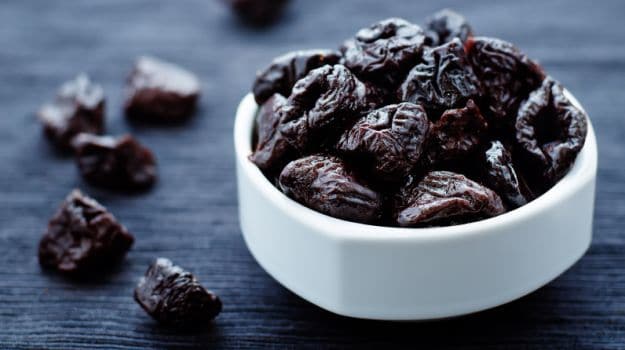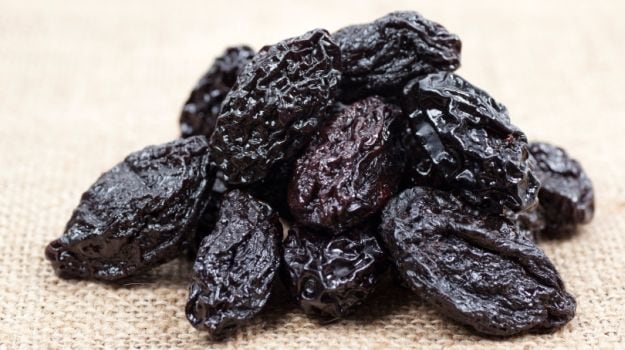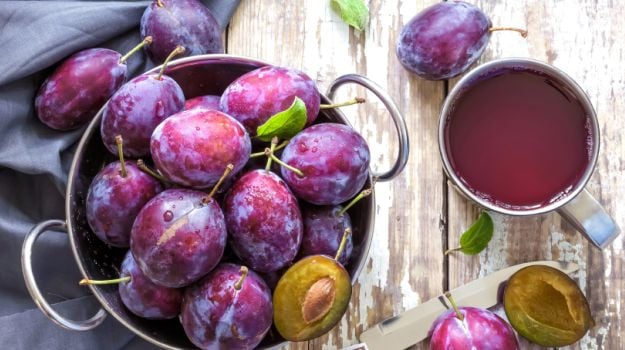Not a fan of prunes? You're not alone. In the US, a research found women of ages 25-54 to react negatively to the idea of prunes, so the California Prune Board pressured the Food and Drug Administration to change the name of prunes to the more inviting “dried plums”. And it worked! Prunes are basically plums that have been dried naturally in the sun without undergoing any fermentation process. “Over my career, I have tested numerous fruits, including figs, dates, strawberries and raisins, and none of them come anywhere close to having the effect on bone density that dried plums or prunes have. All fruits and vegetables have a positive effect on nutrition, but in terms of bone health, this particular food is exceptional”, says researcher Bahram H. Arjmandi, Florida State University. The prune benefits are in abundance.
Also Read:8 Effective Remedies For Constipation As Suggested By Ayurveda
Meet The Dried Plum
All crinkled and wrinkly, this unassuming fruit is surprisingly packed with fiber and a powerhouse of vitamins and minerals, including potassium, iron and retinol. “Prunes are rich in vitamin K and contain beta-carotene. Each prune (approx 9.5 g) offers about 23 kcal and 0.7 g of fiber. An ounce (28g) can be added to smoothies or trail mixes to add to the fiber and antioxidant content”, says Dr. Rupali Datta, Chief Clinical Nutritionist, SmartCooky. Just one cup of prunes provides 87% of the recommended daily intake of vitamin K, more than 20% of most B vitamins, 8% of calcium and 27% of potassium.
Nutritional Values Of Prunes
Prunes are a powerhouse of nutrients and adding them to your daily diet can provide you with a plethora of health benefits. According to the United States Department of Agriculture, a 100-gram serving of prunes contain 240 kcal, 2.18 grams of protein, 7.1 grams of fibre and approximately 63.88 grams of carbohydrates.
Here Are 7 Amazing Health Benefits Of Prunes:
1. Improves Vision
Prunes are a great source of vitamin A, a vitamin that is essential for healthy vision. One prune delivers 3 percent of the recommended daily intake of vitamin A. People who are deficient in vitamin A are prone to night blindness, dry eyes, macular degeneration and cataracts.

2. Powerhouse Of Antioxidants
Blueberries may be high on the antioxidant scale, but surprisingly prunes are even higher. A study conducted by researchers from Tufts University in Boston ranked prunes, or dried plums, as #1 food in terms of antioxidant capacity. Prunes contain manganese, iron and plant phenolics that function as antioxidants and help protect the cell membranes from free radical damage.
3. Heart Healthy
“Prunes are high in potassium, an important mineral that ensures proper functioning of the heart and nerve response throughout the body”, says Dr. Adarsh Kumar, Internal Medicine, National Heart Institute. Daily intake of potassium helps lower blood pressure and reduces the risk of problems such as dizziness, heart disease, heart attack and stroke. One should not overlook the health benefits of prunes.
4. Relieves Constipation
Prunes have been sold as a popular digestive remedy for years together. And when it comes to laxatives, prunes are more effective than even psyllium, according to the April 2011 issue of Alimentary Pharmacology and Therapeutics. Prunes help the body in digesting food properly, to relieve constipation and have regular bowel movement. This is because prunes are high in fiber and sorbitol.

5. Protection Against Osteoporosis
A single serving of prunes (100 grams) fulfills the daily requirement for boron, and the potassium present in prunes helps support bone health. According to Florida State University, prunes may be able to reverse osteoporosis in postmenopausal women. For the study, postmenopausal women were asked to eat 100 grams of dried plums per day and as a result, they had improved bone formation markers after only three months, compared to a control group who were eating 75 grams of dried apples.

6. Promotes Hair Health
Iron deficiency can lead to hair loss, dryness and discoloration of hair. And prunes are great sources of iron, contributing to the overall health of your hair and offering countless benefits to it. They are a source of vitamin B, vitamin C, et al which are great for your hair growth. These nutrients strengthen your hair from the roots and prevent breakage and damage.
7. Great For Skin
The vitamins and minerals present in prunes help in maintaining healthy skin. This humble fruit also helps slow down the aging process and delays development of wrinkles. the presence of many minerals make it quit a good snack, further giving you a glowing skin. How's that for sweet!
Also Read: Load Up On These Nutrients For Healthy And Strong Bones

The Bottom Line
Eating prunes has its benefits, but don't overdo it. Delhi-based Nutritionist Anshul Jaibharat says, “Prunes are high in natural sugar, so too many may not be good for people watching their weight. After all, excess of anything is stored as fat in your body. Prunes have such high nutritional values ensuring that you can eat just one piece and still gain measurable nutrients. You can chop them into fine pieces and add them to hot or cold cereal, blend them in smoothies and shakes in the summer as a sugar substitute or throw them in your cookie batter. Since prunes are loaded with fiber and boost energy, they even work well as a pre-workout snack”.
You can even add prunes in a savoury dish. Basically, any dish you would pair with raisins, pairs beautifully with prunes. Simmer prunes with apples in chicken broth to create a sauce that works well with chicken or pork. You can also boil prunes until they are soft and then puree them to make a prune paste that can be spread on toast, or use bite-sized prunes to top off pizza, pancakes and waffles for added flavour.






